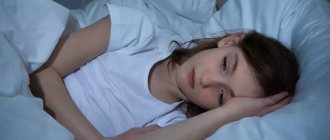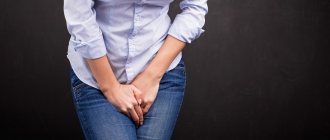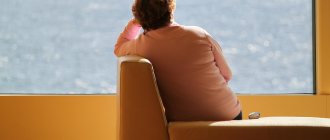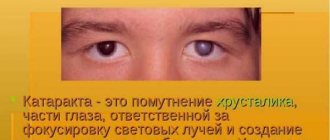Home>Articles>How to cope with insomnia after heavy drinking
quick menu (hide)
- Insomnia after binge drinking
- Types of insomnia
- What to do with insomnia after binge drinking
- How to get rid of insomnia with medication
- Folk remedies for insomnia
One of the side effects of chronic drinking is insomnia. Alcoholism is a serious mental illness characterized by fears, anxiety, psychosis, depression, and suicidal thoughts. Sleep is necessary not only for rest, but also for restoring the body's reserves. Its absence makes a person irritable, aggressive, and unbalanced. Therefore, it is important to know how to get rid of insomnia after binge drinking in order to quickly restore mental and physical health.
Why can there be insomnia after binge drinking?
Excessive consumption of alcohol-containing drinks causes severe intoxication of the body and negatively affects the functioning of all vital organs, including the brain. In the first days after stopping drinking alcohol, a person suffers from a hangover. The longer the binge lasted, the more pronounced the symptoms of this condition will be. These include:
- severe headaches;
- feeling of anxiety, fear;
- frequent vomiting;
- visual/audio hallucinations;
- internal tremor;
- severe fatigue, weakness.
It has been proven that in order to maintain normal functioning of the human body, it is necessary for the slow phases of sleep to turn into fast sleep several times at night. It is during deep sleep that the functioning of vital organs, the cardiovascular system, and the production of melatonin, a hormone that regulates the circadian rhythm, are normalized.
Insomnia after binge drinking occurs as a result of a malfunction in the body's biological clock. A person may confuse day with night, wake up at the slightest rustle, and experience a feeling of anxiety. Due to intermittent sleep, energy reserves are not fully restored, which leads to exacerbation of chronic diseases, depression, weakness, irritability, and dissatisfaction with life. Disturbances in the rhythms of sleep and wakefulness can be observed within 10 days after quitting alcohol.
Why is it dangerous to take sleeping pills when you have a hangover?
Insomnia, or insomnia, after a hangover, and especially after a binge, is exhausting and slows down the process of returning to a normal lifestyle. To cope with it, they resort to a means of helping to sleep - sleeping pills. However, doing this is not entirely correct: taking the drug can negatively affect the general condition and cause an exacerbation of existing pathologies of internal organs. You should take sleeping pills with extreme caution, and you should first consult your doctor.
Different sleeping pills have different effects: some are potent, others have a less pronounced effect. The combination of powerful drugs with alcohol, especially in large doses, can cause:
- unconsciousness up to coma;
- large-scale intoxication of the body, which can provoke the death of nerve cells in the brain;
- respiratory dysfunction;
- cardiac arrest;
- development of severe alcohol withdrawal;
- internal bleeding;
- liver destruction;
- onset of suffocation from vomiting.
Due to the risk of death caused by the combination of alcohol and sleeping pills, when you have a hangover, you need to take into account how long ago the last portion of alcohol was consumed.
With milder over-the-counter drugs, things are also not so simple. Many of them are completely unsuitable for restoring normal sleep disturbed by a hangover. Corvalol, valocordin and validol - popular available remedies that many consider effective for hangover insomnia - cannot be taken in such a situation. Their active components in combination with alcohol have an extremely negative effect on the liver, heart, blood vessels and brain.
Any medications against insomnia due to a hangover can only be used as prescribed by a doctor.
Types of insomnia after heavy drinking
The most common type is the inability to fall asleep on time, which causes a person’s blood pressure to rise, heart rate to increase, feelings of anxiety, fear, and pain in the muscles to arise. The situation aggravated by the fact that a person is trying to solve his problem with the help of alcohol. The addict thinks that this way he can quickly fall asleep.
Restless sleep is another type of alcohol addiction. The person sleeps very lightly. Wakes up with little noise. Constantly nervous and aggressive. Shallow sleep does not bring the desired effect. It seems as if he never went to bed.
The most dangerous type is complete alcoholic insomnia. Disturbances in sleep and wakefulness in this case can cause mental disorders. A person may see visions that he confuses with reality, as a result of which he experiences severe nervous tension. It is important to know how to cope with insomnia after binge drinking in order to avoid extremes.
It is worth considering that this condition occurs due to severe toxic poisoning from ethanol breakdown products. Therefore, it will not be possible to quickly cope with the violation. It will take several days to eliminate the effects of severe alcohol intoxication.
Causes of sleep disorders
Poor sleep and insomnia are observed due to the toxic effects of ethyl alcohol on the body. After alcoholic drinks:
- normal sleep duration is reduced;
- the heartbeat quickens, which is why a person cannot sleep normally;
- as a result of drinking large amounts of alcoholic beverages, oxygen starvation of the brain develops;
- the deep sleep phase is disrupted, making proper rest impossible;
- the so-called restless legs syndrome occurs, involuntary trembling of the hands;
- causeless anxiety, fear, tension increases;
- a person wakes up from even the slightest sound;
- auditory and visual hallucinations develop.
Insomnia
Insomnia can also occur due to alcohol withdrawal syndrome. During a period of prolonged drinking, a person remains in an excited state for a long time. After you stop drinking alcoholic beverages, various phobias appear, preventing you from falling asleep peacefully.
Due to chronic alcohol intoxication, the following develop:
- headache;
- arterial hypertension;
- visual and auditory hallucinations;
- chronic fatigue;
- disruption of the gastrointestinal tract.
They also contribute to the development of insomnia after alcohol. The problem is further aggravated by smoking and watching films that stimulate the nervous system.
What to do with insomnia after binge drinking
Removal from a long-term binge should be carried out under the supervision of a narcologist. In this way, complications with the patient’s mental and physical health will be avoided. The doctor will assess the patient’s condition, prescribe tests, and prescribe treatment taking into account existing chronic pathologies, the patient’s age, experience of substance abuse, and the consequences of toxic poisoning of the body. Treatment begins with detoxification. The patient is prescribed droppers with a solution of glucose and sodium chloride. Additionally added to them:
- vitamins B, C, E, A;
- sedative;
- antiemetic;
- antiepileptic;
- hepatoprotectors.
Droppers can quickly improve blood quality, eliminate the formation of blood clots, normalize the functioning of the cardiovascular system, eliminate hangover symptoms, and improve overall well-being. The detox stage lasts about 4 days. Sedatives are prescribed only as prescribed by a narcologist. Self-medication can lead to serious consequences. Under no circumstances should you take Valocordin and Corvalol 2-3 hours after drinking alcohol. The toxicity of the drugs increases, which negatively affects the liver, which already takes the first blow in case of ethanol poisoning.
When you have insomnia after binge drinking, you need to ask your doctor what to do. You can resort to conservative methods of normalizing sleep on your own at home. It is recommended to drink more fluid. This will thin the blood, speed up metabolic processes, and remove toxic compounds along with urine. Suitable mineral water, freshly squeezed fruit and vegetable juices, which must be consumed on an empty stomach half an hour before meals, compote, and fermented milk products.
You can take a contrast shower. The duration of the procedure is at least 10 minutes. This will improve heart function, normalize blood circulation in the brain, and restore water balance.
Taking activated charcoal will help quickly remove toxins from the body. This inexpensive product is a powerful adsorbent. Therefore, you should not take any medications within 3-4 hours after taking charcoal. Their effect will be neutralized. The dosage of the drug is selected at the rate of 1 tablet for every 10 kg of the patient’s body weight. use is not recommended due to its ability to neutralize not only harmful substances, but also useful ones. Long-term use of activated carbon will lead to weight loss and hypovitaminosis.
Complete instructions on how to overcome insomnia
Detox or detoxification is a cleansing of the body that rids you of toxins and other poisons, done with the help of a drip.
Various solutions and drugs are added to it for certain indications - this is one of the fastest ways to get a person in order after drinking alcohol. It helps restore metabolism that was previously impaired and improve metabolism.
You can cleanse your body in another way:
Physical cleansing - rinsing the gastrointestinal tract. In this way, the stomach is cleansed using soda or potassium permanganate. They also use an enema or herbs with a laxative effect. You can also remove toxins that interfere with sleep using sorbents, for example, activated carbon.
Biochemical neutralization or stimulation are means that improve metabolism, when speed and intensity increase, toxins are eliminated faster.
Succinic or lactic acid helps . Anti-hangover drugs contain large doses of B vitamins and ascorbic acid, all of which have a good effect on the body and eliminate bad substances.
Water treatments - a warm bath with added oils is suitable for women. Men will benefit from a shower. It is not recommended to visit the bathhouse, as there is a lot of stress on the heart.
Read also: What can a cap be made from?
Acidosis is a problem with the acid-base balance. Recovery can be done using a dropper or using simple methods (Mineral water or baking soda).
How to get rid of insomnia after binge drinking using medications
A side effect of a hangover is a severe headache. In this case, you can take a tablet of Aspirin, Zorex or Mexidol. For high blood pressure, take Citramon. But it is more toxic. Just like Paracetamol, it can have a negative effect on the liver. As a sedative, it is better to take Glycine, Afobazol, Valerian, Biotredin, Motherwort, Mexidol.
Valium Roche, Diphenhydramine, Elenium should be used with extreme caution. Medications are prescribed as prescribed by a narcologist. It is worth remembering that you cannot use sleeping pills and sedatives at the same time. You can get the opposite effect.
Sedatives
You can get rid of insomnia after a long binge and suppress increased anxiety with the help of sedatives.
Read also: Is it possible or not
Sedatives reduce the severity of neurological symptoms. For a hangover, you should take natural ingredients or homeopathic remedies. Allowed:
- "Novo-passit";
- "Glycine";
- "Sonylux";
- "Passidorm";
- "Persen";
- valerian;
- motherwort (in any dosage form).
When taking sedatives, you should not exceed the permissible dosage, otherwise disturbances in the functioning of the cardiovascular system are likely.










